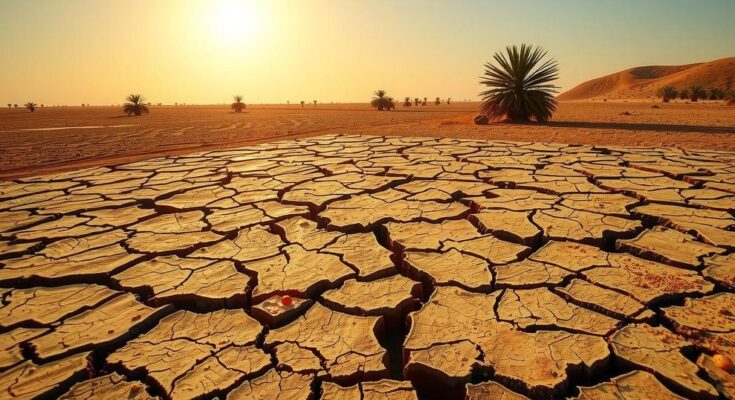A study has found that climate change made a February heat wave in South Sudan ten times more likely, causing school closures due to health risks. The heat wave highlights severe challenges faced by South Sudan, further threatened by ongoing civil instability and food insecurity. Vulnerable populations are at greater risk, necessitating effective adaptations to mitigate heat effects.
A recent study by World Weather Attribution has established that climate change significantly increased the likelihood of the recent heat wave in South Sudan, making it ten times more likely and raising temperatures by 2 degrees Celsius. This intense heat, which affected the capital city of Juba and caused numerous instances of heat stroke among students, forced schools to close for two weeks to protect youth.
South Sudan has been deeply impacted by ongoing challenges, including years of civil war and food insecurity, which compounds the dangers posed by extreme heat. This South-East African nation bears minimal responsibility for global greenhouse gas emissions yet is suffering severe consequences from climate change. “The continent has contributed a tiny fraction of global emissions, but is bearing the brunt of climate change,” remarked Joyce Kimutai, a researcher at Imperial College London.
Heat waves are deadly and increasingly common due to global warming, yet reports on mortality from such events are often underreported and vary across regions. Vulnerable groups such as children, older adults, and pregnant women face heightened risks. In addition to South Sudan, regions in Eastern Africa—including parts of Kenya and Uganda—are currently experiencing extreme heat, straining resources like clean water access as communities are advised to stay indoors.
The inadequate infrastructure in Juba, where only 1 percent of the city features green space, exacerbates residents’ struggles against the heat. Potential adaptations could alleviate some of these challenges. Suggestions from climate expert Kiswendsida Guigma include improving ventilation, increasing greenery, and modifying school schedules to mitigate educational disruptions.
The ongoing instability in South Sudan, especially after a 2018 peace agreement, further complicates its response to climate crises. “Climate change is clearly making life even harder in South Sudan, a country already facing economic challenges and periods of instability,” Dr. Guigma expressed.
As global average temperatures rise, heat waves like the one in February may become more frequent and severe; such events could recur every ten years or, if warming continues unchecked, annually by century’s end. The study warns that higher temperatures in the region are expected to persist into March.
In summary, a recent analysis underscores the significant role of climate change in intensifying the likelihood of severe heat waves in South Sudan. The alarming rise in temperatures highlights the urgent need for effective adaptations to protect vulnerable populations. South Sudan’s existing socio-economic challenges are exacerbated by climate issues, demanding attention and intervention from international communities to ensure the well-being of its citizens.
Original Source: www.nytimes.com




